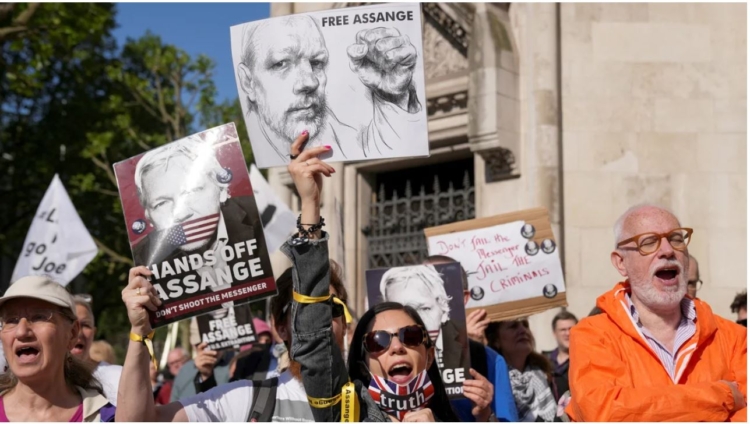A court hearing in which Julian Assange will find out whether he can make a final challenge against his extradition to the United States is underway, but the WikiLeaks founder is not attending.
A few dozen pro-Assange supporters gathered in front of the Royal Courts of Justice in London on Monday, with some carrying flags reading “Let him go Joe,” a reference to US President Joe Biden.
There is also a heavy police presence and plenty of international media in attendance.
Assange is wanted by US authorities on espionage charges connected to his organization’s publication of thousands of classified documents and diplomatic cables in 2010 and 2011. He faces spending the rest of his life behind bars if convicted.
Two High Court judges — Justices Victoria Sharp and Jeremy Johnson — could decide to uphold the UK government’s 2022 extradition decision, allow Assange to appeal or even release him, according to his wife, Stella Assange, who added that “anything could happen at this stage.”
“Julian is just one decision away from being extradited. If the judges find against him on Monday, then there will be no further avenues for appeal in the UK,” she told reporters at a meeting organized by the Foreign Press Association in London last week.
If the High Court rules against Assange, he could seek to prevent his extradition by applying for an emergency injunction — known as rule 39 — from the European Court of Human Rights (ECHR).
Assange’s team has said it intends to put in this request if necessary, following the conclusion of UK legal proceedings, in a last-ditch bid to stop the publisher being put on a plane to the US.
In March, the court delayed its decision on an extradition as the judges sought a series of assurances, including from the US that it would not seek the death penalty for the 52-year-old Australian citizen.
WikiLeaks Editor-in-Chief Kristinn Hrafnsson described Assange’s case and the judicial process as “rigged” to reporters last Wednesday. “This is institutional corruption on a judicial level. Julian Assange is a political prisoner,” he said.
It has been 12 years since the Australian has lived freely.
Assange has spent the past five years in London’s high-security Belmarsh prison and nearly seven years before that holed up at the Ecuadorian embassy in the English capital trying to avoid arrest. He maintains his extradition is politically motivated.
There have recently been more “encouraging” signs that Assange’s years-long legal saga might soon come to an end, according to Australian Prime Minister Anthony Albanese.
The leader said last month that the WikiLeaks founder had “already paid a significant price” and there was “nothing to be gained” by his continued incarceration. In February, the Australian parliament approved a motion calling for Assange to be released to his home country.
Albanese’s remarks came a day after US President Joe Biden said his administration was considering dropping charges against Assange after a request from Australia.
Stella Assange said the Australian government’s moves to support her husband recently had been “crucial.” Responding to a question from CNN, she added that Assange’s case was a “headache” for the US.
“It was brought in under the Trump administration and the constitutional implications are clear,” she said. “There was a recent letter from 40 professors of law of US universities writing to the Biden administration saying this case is an existential threat to the First Amendment.”
Several experts have expressed concern that allowing Assange’s extradition could have broader implications on the freedom of speech and the press.
Sunna Ævarsdóttir, the rapporteur of the Parliamentary Assembly of the Council of Europe, recently visited Assange at Belmarsh Prison in London. Following her visit, she told CNN she had deep concerns for the Australian’s wellbeing.
“He seemed very focused, and he is intent on winning this case, but obviously it has taken a toll, the uncertainty of it all,” she said.
She added that the assurances provided to the court by the US that Assange could lean on First Amendment rights did not seem very credible as officials have often declared them to be “unavailable to foreign nationals.”
“In that respect, it’s not something that should be accepted as a guarantee,” she added.
Alan Rusbridger, editor of the UK political monthly Prospect Magazine, wrote in an op-ed for CNN that working with Assange was “often a bumpy ride” but that their collaboration while he was still the Guardian’s editor-in-chief was “groundbreaking.”
He added that the US case looks “like a very belated attempt to punish whistleblowers and discourage journalists, whether conventional or not, from poking their noses where they’re not welcome.”
Latest Stories
-
CAF Executive Committee approves 2025 Competition Calendar
3 minutes -
FIFA Rankings: Ghana ends 2024 77th in the world, maintains 14th position in Africa
11 minutes -
Kwame Agbodza slams $147m e-gate system as ‘create, loot, and share’ scheme
44 minutes -
Drones deployed in Bawku to track down attackers
2 hours -
Today’s front pages: Thursday, December 19, 2024
2 hours -
ORAL: Not all corruption cases fall under the Special Prosecutor – Domelevo
2 hours -
Two dead and 65 cases of malnutrition recorded in Bawku for 2024
2 hours -
NDC’s control of major media houses gave them edge in 2024 polls, says Bawumia
2 hours -
49th SWAG Awards: High jump Queen Rose Yeboah and Grace Mintah lead nominees for topmost award
3 hours -
ORAL: ‘National Cathedral spending is an ‘expensive pit of deceit’ – Ablakwa
3 hours -
Our people didn’t vote – Bawumia explains why the NPP lost
3 hours -
Dr Bawumia had no choice given Mahama’s decisive victory – Malik Basintale
3 hours -
ORAL: ‘Clergy were misled by Akufo-Addo’ – Ablakwa on National Cathedral scandal
3 hours -
‘It is false’- PMMC refutes claims of politicians smuggling gold from Ghana
3 hours -
2 million NPP supporters did not turn up to vote – Kabiru Mahama
3 hours

